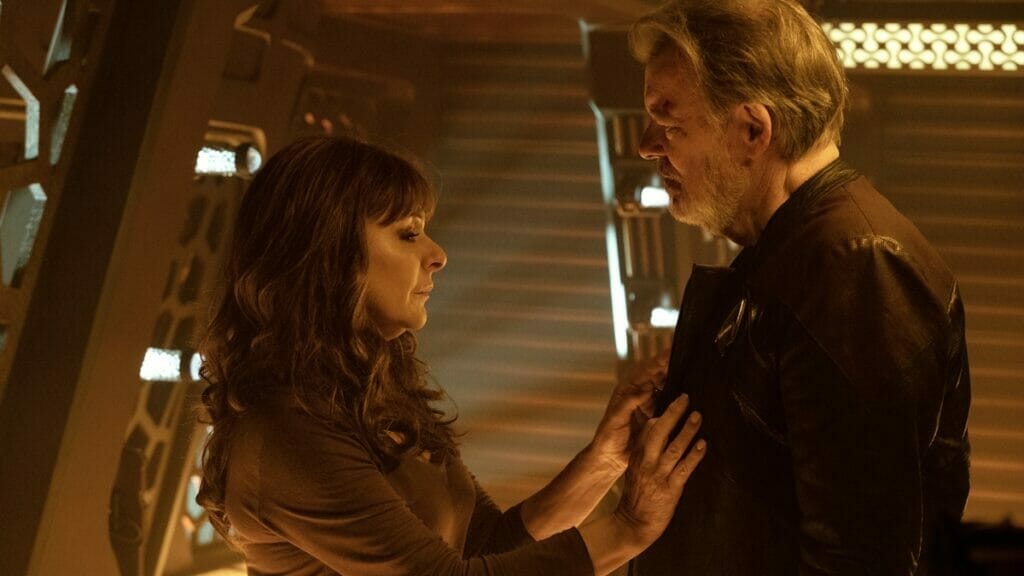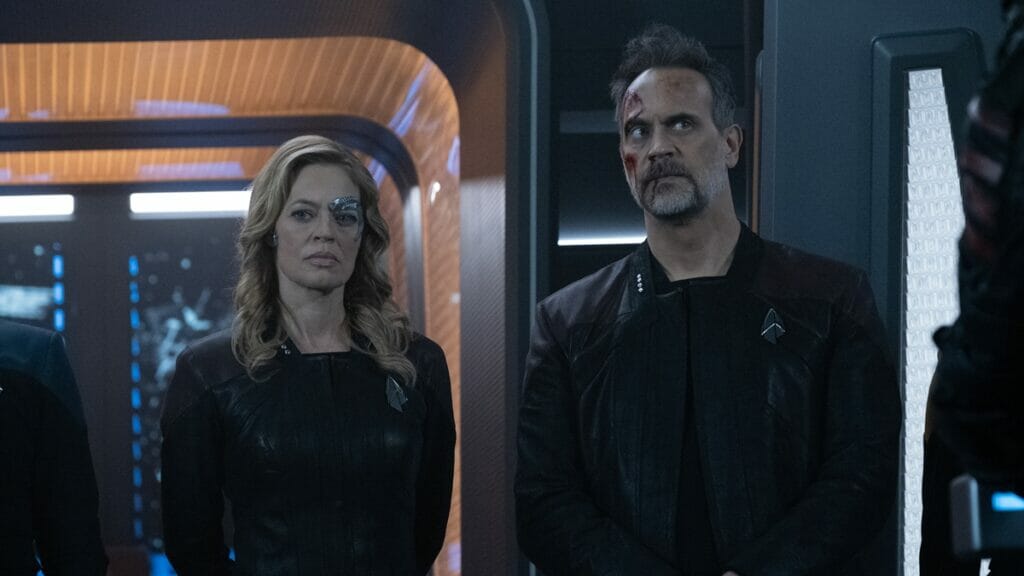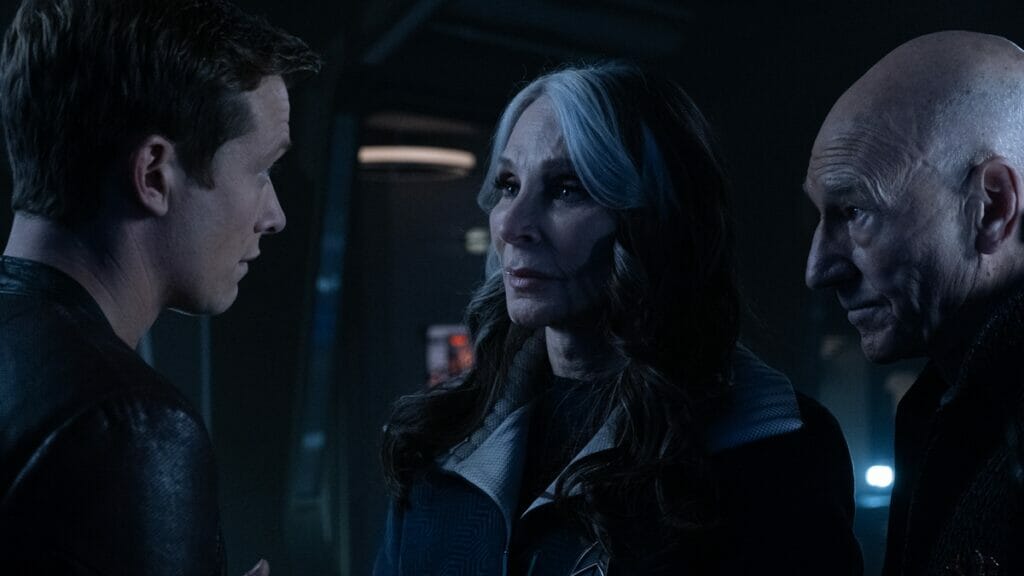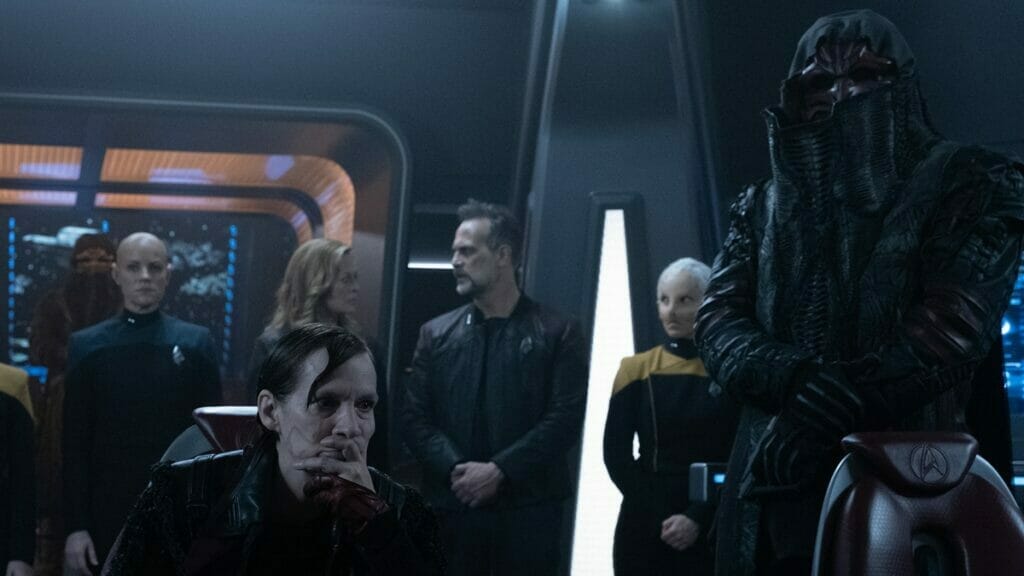Read also:
How to Watch FX Live Without CableHow To Watch AMC Without CableHow to Watch ABC Without CableHow to Watch Paramount Network Without CableFocusing on some key storylines to tie off loose ends before the finale elevates well-intentioned but shakier material.
Star Trek: Picard, and frankly, most modern Trek, works best when its episodes have focus. Especially in the era of serialization, writers seem to feel the need to include an avalanche of characters and subplots each week, which can leave episodes feeling bloated and aimless. Season 3 of Picard has its heap of characters to service, and several narrative irons in the fire, to where it threatens to tip over at any minute.
But “Surrender” gains strength from zeroing in on a few key storylines that command the hour. Vadic (Amanda Plummer) has taken over the USS Titan. Jean-Luc (Patrick Stewart), Beverly (Gates McFadden), and others must decide whether to turn over Jack (Ep Speleers) to her band of baddies or try to regain control through other means. Meanwhile, Data (Brent Spiner) wages an internal war with his brother Lore, while Geordi (LeVar Burton) tries to help him from outside. And Will (Jonathan Frakes) and Deanna (Marina Sirtis) use their imprisonment aboard the Shrike as a chance to resolve their issues while they hope for a rescue.
None of these story threads is amazing. But each has the time to breathe, develop, and eventually feed into one another in a way that’s satisfying, even compared to episodes with better individual elements that nonetheless end up overstretched or underbaked.
 Paramount+)" class="wp-image-41243"/>
Paramount+)" class="wp-image-41243"/>The strongest of the three is the Riker family summit. In a postscript to “No Win Scenario,” Will and Deanna break down the emotional walls between them that emerged in the aftermath of their son’s death. Will admits to feeling numb from the loss, not to mention violated, when his wife encroached on his mind to try to relieve his hardship. Likewise, Deanna admits to some regrets but also confesses the weight of grief she carried from everyone around her at the time.
The emotional exposition at play is blunt and a bit clumsy. But as with many of season 3’s shortcomings, even when the scenes aren’t perfect, Star Trek: Picard’s heart is in the right place with all of this. Fortunately, even twenty years later, Frakes and Sirtis have such incredible charm and chemistry that it helps paper over any ham-handed writing.
[A]s with many of season 3’s shortcomings, even when the scenes aren’t perfect, Star Trek: Picard’s heart is in the right place with all of this.
And the rescue and reunion from Worf (Michael Dorn), with amusing nods to his bond with Deanna, adds to the triumphant feeling of the emotional breakthroughs at play. The bright spots shine brighter when the creative team devotes time to sketching out these key interpersonal moments amid the larger stakes of the episode.
The Data story rises and falls in much the same terms. The internal struggle between Data and Lore for control of Hybrid Data’s mind is a foregone conclusion. No matter the convenient graphical battle between the good blue dots and the evil red dots on the display, any concern about Lore taking over as the dominant personality plays like false jeopardy. Likewise, the theme of Lore accepting Data’s memories but inadvertently accepting Data’s identity in the process is trite but well-intentioned. And the dialogue laying bare all of these points varies between the tin-eared and the downright cheesy.
 Paramount+)" class="wp-image-41242"/>
Paramount+)" class="wp-image-41242"/>And yet, it’s hard to deny the charms of seeing Spiner act opposite himself once more. “Surrender” doesn’t play fair, as Data summons all manner of symbols of long ago: from his Sherlock hat and pipe, to his memorial for Tasha Yar, to none other than Spot(!!!), replete with a testimonial about how his little furry friend taught him how to love. The embrace and resolution between the good twin and the evil one are pretty thin but gain force from its callback to their last encounter in The Next Generation. And providing room for Geordi and Data to have their own mini-reunion as they recount what each means to the other helps some clunky emotional material land with more force than it otherwise could.
The weakest of the three stories is the broader effort to retake the ship from Vadic. We already did the moral dilemma of whether to turn over Jack to the bad guys in order to save the rest of the crew in “Disengaged,” so there’s not much juice left in that orange. In lieu of added substance, “Surrender”’s content to throw in more cryptic hints about Jack’s budding psychic powers, which now allow him to fully possess people. Eight episodes in, and it’s time to put the cards on the table for Crusher Jr. rather than continuing to hint and hint and hint into oblivion.
 Paramount+)" class="wp-image-41244"/>
Paramount+)" class="wp-image-41244"/>This is also a disappointing swan song for Vadic. One might naively assume that, with her backstory and motivations finally explained, she might get to be more of a character now. Nope! She’s back to nothing but preening and taunting, with a mannered performance that feels less and less suited to the moment the longer her scenes linger. The Wrath of Khan remains one of Star Trek’s cinematic high points. Still, it’s also ruined scads of otherwise interesting villains as the franchise has continued to chase that scenery-chewing, bravado-filled dragon ever since. Sadly, Vadic is no exception.
Thankfully, all three of these subplots, when given the time to bloom, come together nicely and provide a satisfying conclusion. Unfortunately, the episode tips its hands a bit too much when Sidney La Forge (Ashlei Sharpe Chestnut) declares that to overcome Vadic’s lockout of the ship’s systems, they’d need someone who can compute at an incredible level. Nevertheless, here comes Data, gifted with a new sense of sass and the ability to overcome Vadic’s digital locks on the Titan!
[T]he structure of an outing like “Surrender,” the willingness to stop and focus on a few key plots and allow them to build toward one another, helps even mixed material sing when it’s done right.
If that weren’t enough, here comes Worf, Raffi (Michelle Hurd), and the Riker family to distract their captors and take down mooks in the hallways with suitable flair. Finally, here comes a high point for Seven (Jeri Ryan), standing firm against these invaders on her ship. And here comes Jack Crusher, conspiring with his parents to blast Vadic and her interlopers into the vacuum of space while protecting Seven and himself via a personal force field. “Surrender” weaves these disparate parts of the episode together, producing a more satisfying whole.
Frankly, that climatic triumph is the natural endpoint for the episode. Vadic cracking into a thousand pieces after crashing into the bow of her own ship is a visually cathartic defeat of the main antagonist to date. The immediate danger has been conquered. The threat to Jack that started this whole kerfuffle is neutralized. Taking a moment to bask in that, to let the characters exalt in their triumph, would help the importance of this victory land.
 Paramount+)" class="wp-image-41240"/>
Paramount+)" class="wp-image-41240"/>Instead, “Surrender” lurches on, a bit aimlessly, for another ten minutes or so. The show needs to set up that there’s still a grand threat to Frontier Day that our heroes must figure out. The show needs to continue teasing some answers about Jack’s condition (which increasingly seems like a Charlie X/Gary Mitchell-type situation) with the help of Deanna. And most of all, the show needs to put all the Next Generation vets in a room together before the fireworks begin.
I’m not made of stone. It is undeniably rousing to watch the crew of the Enterprise-D gather around a long table once more. But here again, the dialogue is so unnatural and exposition-laden that even the chemistry of seven people who worked together for years seems to falter. More to the point, their big scene comes in a narrative no man’s land. It’s not quite a postscript to the major events of this episode, and not quite a prelude to the undoubtedly bombastic endgame still to come, which makes the reunion ultimately feel pleasant but a bit hollow.
Still, Star Trek: Picard continues to set a commendable course. Not every storyline clicks. Not every personality clash works. But the structure of an outing like “Surrender,” the willingness to stop and focus on a few key plots and allow them to build toward one another, helps even mixed material sing when it’s done right.